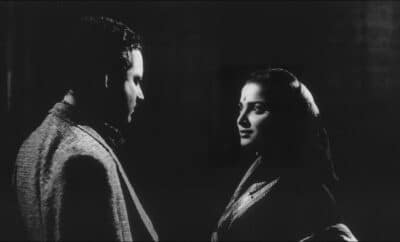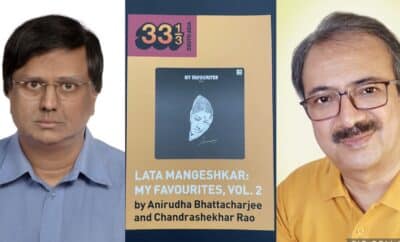Legends
Madan Mohan’s Melodies in Various Voices
When one pronounces the two magical words “Madan Mohan”, what starts playing on a music lover’s mind are all the mellisonant melodies with which the magician of music has persistently spoilt the listeners for choice for over two decades.
His name is synonymous with finest ghazals that Hindi films have ever had. The name also reminds us of sentimental tunes widely exploring different shades of pathos, that leave an ever-lasting impression in our minds despite sparse and minimalistic orchestration. He unfortunately did not get a due share of success in materialistic terms, for he preferred remaining honest to his art rather than spending the time and energy on ideas to encash it. That is why, whatever music he created was consistently memorable and is cherished by music lovers even today, decades after its creation.
When Madan Mohan’s music is discussed, what is largely talked about is his joint repertoire with Lata Mangeshkar. A school of thought says that there remains nothing in Madan Mohan’s music, if Lata Mangeshkar is subtracted. No doubt, they complemented each other very well and made a legendary pair, but there is still a lot to his music sans Lata Mangeshkar. Let us briefly explore Madan Mohan’s songs in various voices.
1. Lata Mangeshkar – Betaab Dil Ki Tamanna Yahi Hai (Hanste Zakhm – 1973)
As we all know, Lata Mangeshkar was the mainstay of Madan Mohan’s music. Theirs was an iconic alliance, that started from Madan Mohan’s second film till his last film Veer Zaara, the songs of which were recorded posthumously in 2004. However, there is an interesting anecdote on how their collaboration started.
Madan Mohan started his career in Hindi films by assisting composers like Shyam Sunder and C. Ramchandra in 1940s. Madan Mohan happened to attend the recording of Lata Mangeshkar’s celebrated song “Aayega aanewala” and was thrilled with her rendition. He soon happened to record a duet with her under Ghulam Haider’s music direction. When Lata Mangeshkar complimented him for his singing, he shared with her that his real ambition was to become a music director and asked her if she would sing for him when he became one. Very soon, he approached Lata Mangeshkar to sing for his first film Aankhen (1950). However, Lata Mangeshkar refused the offer as some of Madan Mohan’s ill-wishers had calumniously poisoned her against him. Nonetheless, Madan Mohan succeeded in making a mark as a talented music director with Aankhen; and then Lata Mangeshkar couldn’t refuse his offer to sing for his second film Ada (1951) (according to some accounts, Madhosh, both released in the same year).
Lata Mangeshkar sincerely apologised before recording the first song for Madan Mohan, who graciously accepted the apologies. A beginning was marked – not only of a brother-sister relationship, but also of a musical era – and there was no looking back thereafter!
Choosing one song out of their saccharine joint songs is next to impossible. Would one choose their most celebrated and evergreen romantic song “Lag ja gale” (Woh Kaun Thi? – 1964), or “Zara see aahat hoti hai” (Haqeeqat – 1964)? Would it be “Tu pyaar kare ya thukaraaye” (Dekh Kabeera Roya – 1957) or “Hum pyaar mein jalne waalon ko” (Jailor – 1958)? Or “Aap ki nazaron ne samjha” (Anpadh – 1962) or “Mera saaya saath hoga” (Mera Saaya – 1966)? One better than the other! Endless dilemma!
One such haunting yet somewhat underrated Lata solo is “Betaab dil ki tamanna yahi hai” from Hanste Zakhm (1973). The tune of the song is kind of offbeat, with somewhat longish stanzas, with multiple mellifluous lines unwinding one after another. The piece of Santoor towards the end of the first interlude of the song is used as a part of the prelude of “Hai tere saath meri wafa” (Hindustan Ki Kasam – 1973), or vice versa, depending on which song was composed and recorded first.
The song is written by Kaifi Azmi and filmed on Priya Rajwansh alongside Navin Nischol.
2. Mohammed Rafi – Teri Aankhon Ke Siwa (Chirag – 1969)
Though Lata Mangeshkar denied singing for Madan Mohan’s first film Aankhen (1950), the film marked the beginning of his long-lasting collaboration with his favourite male singer Mohammed Rafi. Their collaboration has given us quite a few unforgettable songs like “Main nigaahen tere chehere se hataaoon kaise?” (Aap Ki Parchhaiyaan – 1964), “Rang aur noor ki baraat” (Ghazal – 1964), “Aap ke pehloo mein aa kar ro diye” (Mera Saaya – 1966), “Ek haseen shaam ko” (Dulhan Ek Raat Ki – 1966) and many more.
A soft and surreally romantic song in this league is “Teri aankhon ke siwa duniya mein rakha kya hai?” from Chirag (1969). Mohammed Rafi has rendered the song tenderly, to make complete justice with the mood of the song. It is a tandem song, with the other version rendered by Lata Mangeshkar. The song is written by Majrooh Sultanpuri and filmed on the protagonists, Sunil Dutt and Asha Parkeh.
3. Asha Bhosle – Shokh Nazar Ki Bijliyaan (Woh Kaun Thi? – 1964)
Say Madan Mohan and Asha Bhosle – and the song that springs up without fail is the evergreen, foot tapping, frolicky dance number “Jhumka gira re” (Mera Saaya – 1966), but the combination is much more than that! For instance, “Ashqon se teri hum ne” (Dekh Kabeera Roya – 1957) and “Saba se ye keh do” (Bank Manager – 1959).
One of their best songs together (if not the best) is “Shokh nazar ki bijliyaan dil pe mere giraaye ja” from (Woh Kaun Thi? – 1964). Raja Mehdi Ali Khan is the lyricist.
Asha strikes like a lightning. Her “Ah ha ha ha” lifts you up on the wings of melody. She’s seductive, sensual and innocent at the same time. A deadly combination!
4. Kishore Kumar – Simti Si, Sharmaai Si (Parwana – 1971)
Madan Mohan used Kishore Kumar sporadically. However, they have given us some songs worth cherishing, like “Mera naam Abdul Rehman” (Bhai Bhai – 1956), “Zaroorat hai zaroorat hai” (Manmauji – 1962), “Har ki chahta hai ek mutthi aasmaan” (Ek Mutthi Aasman – 1973) etc.
The romantic Kishore Solo “Simti si, sharmaai si” from Parwana (1971), which does not seem like a Madan Mohan song is also noteworthy.
5. Talat Mahmood – Meri Yaad Mein Tum Na Aansoo Bahaana (Madhosh – 1951)
Besides Anil Biswas and C. Ramchandra, Madan Mohan was one of the very few composers, who made a beautiful use of the unique texture of Talat Mahmood’s voice. Though the emperor of ghazals – Talat Mahmood – who had a silken voice with a unique tremolo, could never make it to the league of the always-in-demand versatile playback singers like Mohammed Rafi and Kishore Kumar due to the peculiar texture of his voice, he always remained the playback singer of choice of a few composers including Madan Mohan for soulful and romantic songs due to this very quality.
Madan Mohan and Talat Mahmood have jointly created many feather-soft melodies like “Mera qaraar le ja” (Ashiana – 1952), “Hum se aaya na gaya” (Dekh Kabeera Roya – 1957) and “Phir wohi shaam” (Jahaan Aara – 1964).
“Meri yaad mein tum na aansoo bahaana” from Madhosh (1951) is one of their fabulous join creations in the early years. This is a soulful song expressing the woe of partition with the beloved, through Raja Mehdi Ali Khan’s befitting words and Madan Mohan’s moving composition orchestrated mainly with violins and sitar, which is rendered by Talat Mahmood in a heart wrenching way.
6. Mukesh – Bhooli Hui Yaadon (Sanjog – 1961)
Mukesh has sung only 9 odd songs for Madan Mohan, out of which, 2 were for Sanjog (1961) – the romantic duet with Lata Mangeshkar, “Ek manzil, raahi do” and the heart-rending solo “Bhooli hui yaadon”.
7. Manna Dey – Tum Bin Jeevan, Kaisa Jeevan (Bawarchi – 1972)
Manna Dey was also not a frequent appearance in Madan Mohan’s music, though he has sung a handful of fantastic songs for Madan Mohan, like the semiclassical duet with Lata Mangeshkar – “Preetam daras dikhaao” (Chaha Zindabad – 1959), “Har taraf ab yahi afsaane hain” (Hindustan Ki Kasam – 1973) and this soulful and atypical solo from Bawarchi (1972) –
8. Geeta Dutt – Ae Dil Mujhe Bata De (Bhai Bhai – 1956)
Geeta Dutt sang about 20 songs for Madan Mohan in the 1950s, starting from Adaa (1951). One song composed by Madan Mohan for Geeta Dutt which will always be remembered is “Ae dil mujhe bata dein tu kis pe aa gaya hai” from Bhai Bhai (1956), filmed on Shyama. The song is completely a Geeta Dutt song and an epitome of her spontaneity and power of conveying the essence of a song!
9. Suman Kalyanpur – Mujhe Ye Phool Na De (Ghazal – 1964)
Suman Kalyanpur seems to have sung only 2 songs for Madan Mohan, both of which were duets with Mohammed Rafi – “Baad muddat ke ye ghadi aayi” (Jahaan Aara – 1964) and “Mujhe ye phool na de” (Ghazal – 1964). Both these songs belong to the period when Lata Mangeshkar and Mohammed Rafi were not singing together due to their historic rift over the royalty issue.
10. Mahendra Kapoor – Bas Ek Saza Hi Toh Hai Zindagi (Jailor – 1958)
Madan Mohan used Mahendra Kapoor’s voice very selectively. Most of the songs that Mahendra Kapoor rendered for him were duets, which included the famous one – “Chhod kar tere pyar ka daman” (Who Kaun Thi? – 1964) sung with Lata Mangeshkar. Here is a forgotten solo from Madan Mohan’s celebrated soundtrack of Jailor (1958).
Thus, even if Lata Mangeshkar is subtracted from Madan Mohan’s music, what still remains is a lot many deep and romantic songs in Mohammed Rafi’s malleable voice, several peppy as well as soft romantic numbers in Asha Bhosle’s voice, numerous velvety and sentimental ghazals and songs in Talat Mahmood’s silky voice and quite a few euphonious songs sung by other leading singers too, albeit a handful each.




Pratik
June 25, 2024 at 10:39 am
Wonderfully compiled selection of songs and beautifully described. Loved reading it and on the way discovered a few gems I was not aware of. Many thanks for this wonderful writeup
YOGESH
June 26, 2024 at 6:26 pm
Many thanks!!
Nirmala
June 25, 2024 at 12:26 pm
Excellent writing. I was amused when I heard that Madan Mohan who composed such romantic songs was working in Army.
YOGESH
June 26, 2024 at 6:27 pm
Thank you!
Wedding Jewellery Madurai
April 2, 2025 at 7:25 pm
I enjoyed every bit of this post!